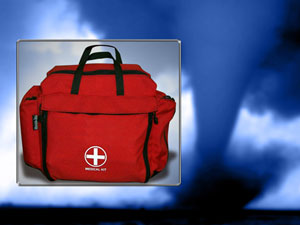
(FinalCall.com) – A tornado was the last thing residents of a Washington, D.C. suburb expected in May, but with today’s unpredictable weather, almost anything seems possible. Nisa Islam Muhammad, a Final Call staff writer, experienced the severe winds firsthand.
“The wind started howling and the noise was incredible. I felt like Dorothy in the Wizard of Oz and all I could do was wait it out,” Ms. Muhammad said. “When the wind and rain stopped so did the power. It was off for 24 hours.” She lives in Silver Spring, Md.
She had a survival kit ready with batteries, candles and flashlights. “Who would have thought a tornado in Silver Spring? It pays to be ready for whatever,” she said.
While Ms. Muhammad was prepared, a 2007 Red Cross survey found 93 percent of Americans are not prepared for a major calamity. For homeowners such as Ms. Muhammad, there are many steps to take towards preparedness. But, too few people are taking those steps as well.
A recent National Association of Insurance Commissioners survey found 48 percent of Americans had not taken an inventory of their possessions, while 32 percent had not photographed their possessions, and 58 percent had no receipts showing the costs of what they owned. The association is an organization of state insurance regulators for all 50 states headquartered in Kansas City, Mo. Their survey also noted that 65 percent of Americans were without flood insurance.
“Disaster preparedness is no longer something we can rely on people to do on their own,” said Aton Edwards, a co-founder of the New York-based International Preparedness Network. Mr. Edwards is one of many preparedness advocates who say the federal government must make preparedness a national imperative.
But, he said, it must also be an individual imperative.
People are always asking government agencies how are they going to respond in a disaster, he said. “Well you have a big role in taking care of you,” Mr. Edwards said.
Many municipalities are holding emergency preparedness fairs to help citizens understand the importance of preparing emergency kits, food storage and protecting important documents.
Some advise sending important documents to close relatives or storing them in a bank safety deposit box.
There is also concern that too much apathy exists in the Black community when it comes to disaster preparedness.
“When I hold workshops, most of the Blacks who attend are members of the Nation of Islam, for some reason they seem to understand what time it is,” observed Mr. Edwards. “I recently held a forum in lower Manhattan, and the place was packed with Whites, only three Blacks,” he said.
Stephanie Gadlin, producer at Chicago radio station WVON, said, “There is a severe disconnect between the public and private sector in how preparedness is being implemented in Black communities.” She responded to questions via e-mail.
WVON talk show host Cliff Kelly has had Mr. Edwards on his show to discuss disaster preparedness.
Some things are being done in Illinois around disaster preparedness, but there is a severe lack of resources, training programs, disaster kits and educational materials being distributed to the people who will need them the most, she said.
“The lessons learned from Katrina should have been enough to ignite an independent firestorm of activity by Black leaders and organizations,” Ms. Gadlin continued. Preparedness must now be the rallying cry where ever we live, she added. “We must learn all we can and then engage in targeted preparedness training while simultaneously working to acquire resources that will aid in the preservation of life,” said Ms. Gadlin.
Preparedness advocates suggest having “to go” bags in case of a disaster. They advise packing two bags, one with short-term items such as toiletries, radio, flashlights and batteries and the other should contain cash, especially coins for vending machines, over the counter medicines for pain and allergy relief, first aid items, dust masks and gloves, plastic trash bags and water.












